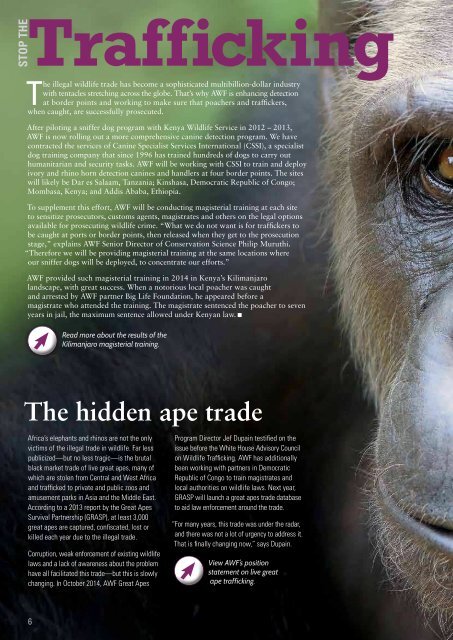awf-2014-report
awf-2014-report
awf-2014-report
Create successful ePaper yourself
Turn your PDF publications into a flip-book with our unique Google optimized e-Paper software.
STOP THE<br />
Trafficking<br />
The illegal wildlife trade has become a sophisticated multibillion-dollar industry<br />
with tentacles stretching across the globe. That’s why AWF is enhancing detection<br />
at border points and working to make sure that poachers and traffickers,<br />
when caught, are successfully prosecuted.<br />
After piloting a sniffer dog program with Kenya Wildlife Service in 2012 – 2013,<br />
AWF is now rolling out a more comprehensive canine detection program. We have<br />
contracted the services of Canine Specialist Services International (CSSI), a specialist<br />
dog training company that since 1996 has trained hundreds of dogs to carry out<br />
humanitarian and security tasks. AWF will be working with CSSI to train and deploy<br />
ivory and rhino horn detection canines and handlers at four border points. The sites<br />
will likely be Dar es Salaam, Tanzania; Kinshasa, Democratic Republic of Congo;<br />
Mombasa, Kenya; and Addis Ababa, Ethiopia.<br />
To supplement this effort, AWF will be conducting magisterial training at each site<br />
to sensitize prosecutors, customs agents, magistrates and others on the legal options<br />
available for prosecuting wildlife crime. “What we do not want is for traffickers to<br />
be caught at ports or border points, then released when they get to the prosecution<br />
stage,” explains AWF Senior Director of Conservation Science Philip Muruthi.<br />
“Therefore we will be providing magisterial training at the same locations where<br />
our sniffer dogs will be deployed, to concentrate our efforts.”<br />
AWF provided such magisterial training in <strong>2014</strong> in Kenya’s Kilimanjaro<br />
landscape, with great success. When a notorious local poacher was caught<br />
and arrested by AWF partner Big Life Foundation, he appeared before a<br />
magistrate who attended the training. The magistrate sentenced the poacher to seven<br />
years in jail, the maximum sentence allowed under Kenyan law.<br />
Read more about the results of the<br />
Kilimanjaro magisterial training.<br />
The hidden ape trade<br />
Africa’s elephants and rhinos are not the only<br />
victims of the illegal trade in wildlife. Far less<br />
publicized—but no less tragic—is the brutal<br />
black market trade of live great apes, many of<br />
which are stolen from Central and West Africa<br />
and trafficked to private and public zoos and<br />
amusement parks in Asia and the Middle East.<br />
According to a 2013 <strong>report</strong> by the Great Apes<br />
Survival Partnership (GRASP), at least 3,000<br />
great apes are captured, confiscated, lost or<br />
killed each year due to the illegal trade.<br />
Corruption, weak enforcement of existing wildlife<br />
laws and a lack of awareness about the problem<br />
have all facilitated this trade—but this is slowly<br />
changing. In October <strong>2014</strong>, AWF Great Apes<br />
Program Director Jef Dupain testified on the<br />
issue before the White House Advisory Council<br />
on Wildlife Trafficking. AWF has additionally<br />
been working with partners in Democratic<br />
Republic of Congo to train magistrates and<br />
local authorities on wildlife laws. Next year,<br />
GRASP will launch a great apes trade database<br />
to aid law enforcement around the trade.<br />
“For many years, this trade was under the radar,<br />
and there was not a lot of urgency to address it.<br />
That is finally changing now,” says Dupain.<br />
View AWF’s position<br />
statement on live great<br />
ape trafficking.<br />
True cost<br />
of trafficking<br />
Environmental crime is more than ivory and rhino<br />
horn trafficking—there’s also the illegal trafficking<br />
of timber, fish, charcoal, minerals and more. It’s<br />
a big business, worth between US$70 billion and<br />
US$213 billion annually, according to a <strong>2014</strong> <strong>report</strong><br />
by the UN Environment Programme and INTERPOL.<br />
The same <strong>report</strong> adds that these illegal industries<br />
have become a source of income for militias and<br />
terrorist groups in Africa—Al Shabaab <strong>report</strong>edly<br />
makes between US$38 million to US$56 million each<br />
year from taxing charcoal—demonstrating that<br />
environmental crime not only impacts ecosystems<br />
and the tourism industry but also undermines<br />
regional peace and security.<br />
Habitat loss and the bushmeat trade are the primary drivers behind the decline in<br />
great ape populations, but the demand for live apes is both widespread and growing.<br />
6<br />
7


